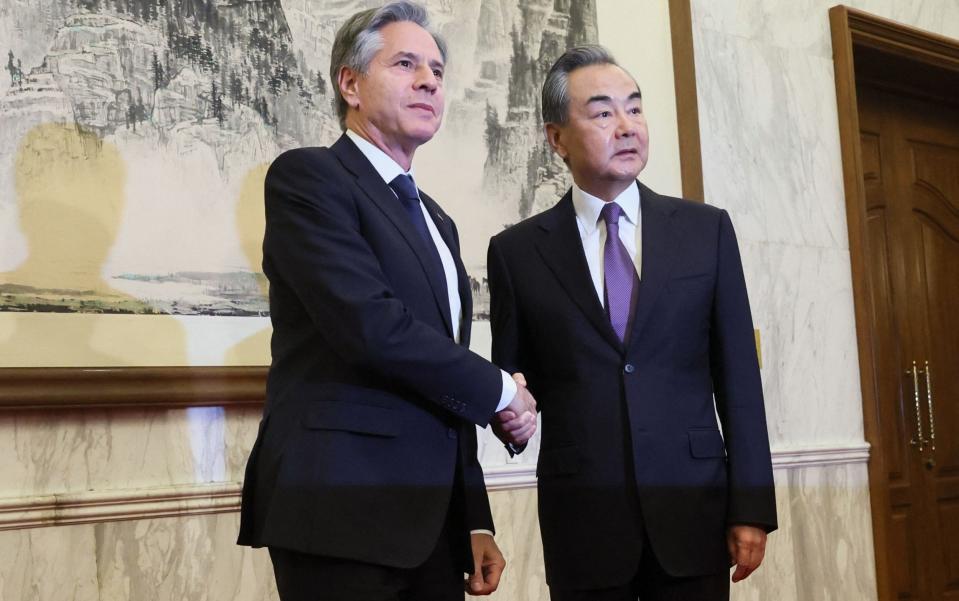Xi Jinping is humiliating the United States

It was as well that the Biden administration lowered expectations of Secretary of State Antony Blinken’s visit to China. The long-anticipated diplomatic venture – postponed as a result of the furore in February over a Chinese spy balloon in the skies above the US – was the first such tour for five years, demonstrating how low relations have sunk.
The trip did not go well. China spoke to America as if it were a junior partner in their relationship. And while Blinken’s meeting with Foreign Minister Qin Gang has been described by both sides as “constructive, with a desire to reduce tensions”, the Secretary of State was by contrast exposed to an uncompromisingly stern lecture from China’s top diplomat, Wang Yi.
Wang is regarded as embodying the aggressive “wolf warrior” approach to diplomacy – the quarrelsome style whereby Chinese diplomats choose public, acrimonious confrontation with other countries, rather than the traditionally discreet role associated with the diplomatic profession. Domestically, being seen to stand up for China is popular, judging by the support that wolf warriors enjoy on social media at home, however much that jars with their international interlocutors.
In their meeting, Wang made no attempt to smooth over the challenges in overcoming the mistrust and friction that has come to characterise the bilateral relationship. Repeating Beijing’s well-worn tropes, Wang blamed Washington’s “wrong perception” of China as the “root cause” of the decline in the two sides’ relations, and demanded the US stop “suppressing” China’s technological development and hyping the “China threat,” according to the Chinese state broadcaster CCTV.
Wang also told Blinken that his visit came at “a critical juncture in US-China relations, where a choice needs to be made between dialogue or confrontation, co-operation or conflict.” And on Taiwan, he emphasised that the nation is one of China’s “core interests”, over which it “has no room for compromise or concession”. The US, it was said, must “respect China’s sovereignty and territorial integrity and clearly oppose Taiwan independence”.
Blinken, mistakenly, struck a far more conciliatory tone, stressing the need for open channels of communication to ensure “competition does not veer into conflict”. But there was no sign of a significant upturn or a breakthrough.
Putting the most optimistic gloss on the visit, one could describe the whole range of bilateral disagreements as “work in progress”. That long list includes trade, Taiwan, human rights in China and Hong Kong, and Chinese military assertiveness in the South China Sea, not to mention China’s at best neutral attitude to Russia’s invasion of Ukraine.
Yet this work in progress is struggling to produce any fruit. At the end of his visit, and after considerable uncertainty over whether it would take place, Blinken had a half-hour meeting with President Xi in the Great Hall of the People. This was only publicly announced about an hour before it went ahead. Given Xi’s willingness to meet Bill Gates (whom he described as an “old friend”) a few days earlier, it undoubtedly put the US in the position of supplicant.
A failure to schedule a face-to-face meeting with Blinken would have been taken as a serious snub by Washington, breaking with the precedent of a number of previous visits from American Secretaries of State going back to Henry Kissinger. Xi is said to have told Blinken that while the world needed a stable Sino-US relationship, the United States must respect China and not harm China’s legitimate rights and interests.
Ultimately, China’s brinksmanship over the meeting, and Blinken’s dressing-down by Wang, are all of a piece with China’s growing self-confidence and assertiveness. The Middle Kingdom’s message to the West is clear: You need us, we can get along without you. If we’re going to get along together, it’s on our terms.
Sir Ivor Roberts is a former British ambassador to Yugoslavia, Ireland and Italy

 Yahoo Sports
Yahoo Sports 